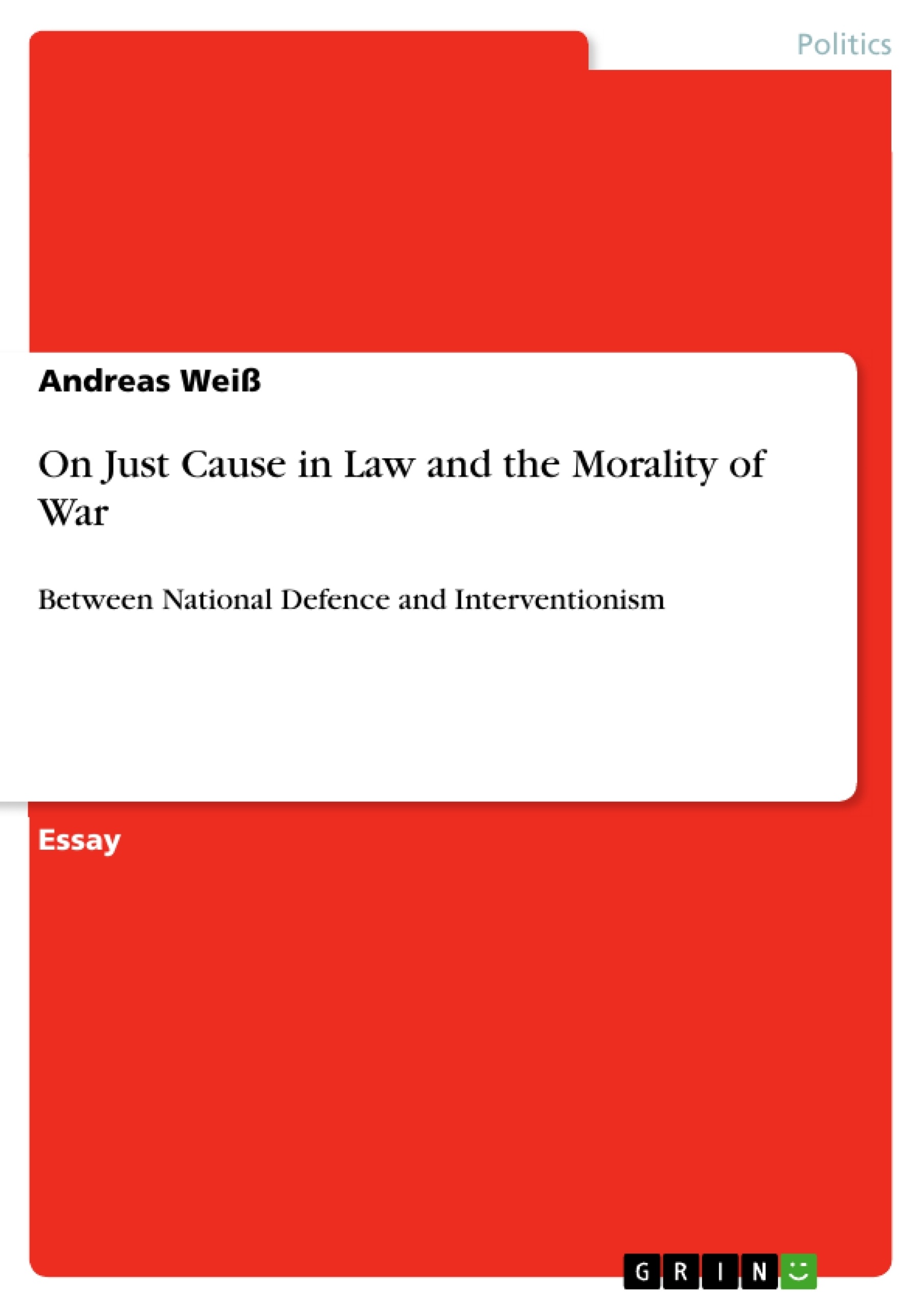As the Spaniard Francisco de Vitoria noticed, war can only be justified as response to previous wrongs. The issue here is the extent and manner of inflicted harm justifying the use of violence on behalf of third parties – the legal and moral preconditions for interventions. National defence should remain the central basis for just cause in the law and morality of war, however, in the area of tension between national self-determination and the most fundamental human rights, the prevalent principle of non-intervention reaches its limits and allows for humanitarian interventions as response to acts that shock the moral conscience of mankind.
In order to avoid instrumentalization or misemployment of these instruments and guarantee protection of peoples from human rights abuses, an institutionalization is absolutely essential; hence, proper international authority has to be established and has to conduct these interventions on multilateral grounds with care for the cultural circumstances – for the solution of societal problems and of nation-building cannot simply be imposed on nations from outside.
Inhaltsverzeichnis (Table of Contents)
- Part I
- The most basic distinction in just war theory
- Part II
- Thomas Aquinas provided the classic statement of the traditional just war theory
- Part III
- The task of properly realizing the moral ideas of just war theory
Zielsetzung und Themenschwerpunkte (Objectives and Key Themes)
This essay examines the legal and moral tensions surrounding humanitarian interventions, specifically focusing on the concept of "just cause" in the context of war. It argues that the traditional notion of just cause, based on national defense against previous wrongs, needs to be adapted to address the contemporary challenges posed by human rights abuses and "asymmetric warfare." The essay aims to define just cause in light of humanitarian intervention, justify war for the sake of human rights, and explore the limitations and responsibilities associated with such interventions.
- Just cause in the law and morality of war
- Humanitarian interventions and the principle of non-intervention
- The role of international authority in conducting humanitarian interventions
- The limits of interventionist humanitarian acts of violence
- The cultural context of intervention and nation-building
Zusammenfassung der Kapitel (Chapter Summaries)
Part I
This part delves into the fundamental distinction in just war theory between jus ad bellum (reasons for going to war) and jus in bello (rules of conduct in war). It examines the concept of just cause, emphasizing its role as a unilateral response to prior wrongdoing. The discussion explores the idea of "regular war" as a challenge to just cause, emphasizing the complexities of moral equality in war and the potential for justifying violence as law enforcement or punishment. The part concludes with a discussion of how the principle of non-intervention may be justified in cases of human rights abuses and how just cause applies to "asymmetric warfare."
Part II
This part builds upon the concept of just cause established in Part I, focusing specifically on the justification for waging war for the sake of human rights. It explores the traditional just war theory as developed by Thomas Aquinas, examining the conditions for jus ad bellum and the role of human rights in justifying war. The part also discusses the challenges posed by "asymmetric warfare," particularly terrorism, and how moral equality might apply to different types of conflict.
Part III
This part explores the crucial question of properly realizing the moral ideas of just war theory, particularly in the context of humanitarian interventions. It focuses on the need for proper international authority and the careful consideration of cultural circumstances when undertaking interventions. The part emphasizes the limitations of interventionist humanitarian acts of violence and the importance of understanding the cultural context of nation-building.
Schlüsselwörter (Keywords)
This essay explores the key concepts of just war theory, human rights, international law, humanitarian intervention, non-intervention, national defense, asymmetric warfare, terrorism, and cultural context. It delves into the ethical considerations surrounding the use of violence and the moral responsibilities of states in a globalized world. The essay also highlights the need for international institutions and authority to ensure the legitimacy and effectiveness of humanitarian interventions.
Frequently Asked Questions
What is the concept of "just cause" in the morality of war?
Just cause refers to the legal and moral justification for going to war, traditionally rooted in national defense as a response to previous wrongs or aggression.
When is humanitarian intervention morally justified?
Intervention is considered justified when fundamental human rights are violated in ways that "shock the moral conscience of mankind," overriding the principle of non-intervention.
What is the difference between jus ad bellum and jus in bello?
Jus ad bellum concerns the justice of resorting to war (the reasons), while jus in bello refers to the justice of conduct within the war (the rules of engagement).
How does asymmetric warfare affect the idea of just war?
Asymmetric warfare, such as terrorism, challenges traditional concepts of moral equality between combatants and complicates the application of just cause.
Why is international authority essential for interventions?
Institutionalization and multilateral authority are necessary to prevent the instrumentalization or abuse of humanitarian interventions by individual nations.
- Quote paper
- Andreas Weiß (Author), 2009, On Just Cause in Law and the Morality of War, Munich, GRIN Verlag, https://www.grin.com/document/310548



